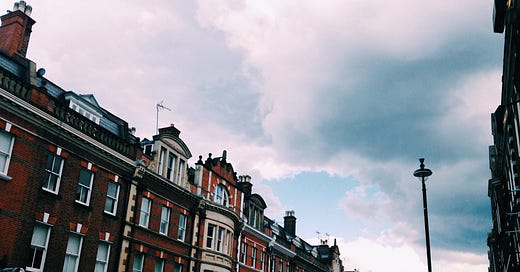I’ve been emailing with Irène, who is persistently one of my best and most thoughtful critics, about cities.
She sometimes feels the opposite of me, using my word “claustrophobic” for her feeling of being in a too-small city (like the one we both live in); the city that hems you in by its very provinciality or limits.
I love hearing about this, because her natural instinct is so different from mine. I’m petrified of risk and excess movement. If given the choice between striking out or staying put, I’m putting down roots. “Claustrophobic” is always on the tip of my tongue when I’m in a place like New York and I can’t find the sky or a glimpse of a single plant. After a day beneath skyscrapers, I feel like I’m suffocating.
Not everyone feels this way, clearly. Many people love the city: the hum, the restlessness, the energy. I believe them. But I find that passion harder to understand, the more accustomed I grow to living in a small city. I crave my little house and my overgrown garden and my meandering river.
“There is a man who travels around the world trying to find places where you can stand still and hear no human sound. It is impossible to feel calm in cities, he believes, because we so rarely hear birdsong there. Our ears evolved to be our warning systems. We are on high alert in places where no birds sing. To live in a city is to be forever flinching.”
— Dept. of Speculation, Jenny Offill
Guion is always tuned in to my current wavelength, and he read me this poem the other day. He’s been translating poems from Portuguese (because when you’re a 4w5, you can’t help yourself) and has gone deep with Fernando Pessoa.
Here’s the poem he read me, by “Alberto Caeiro” (one of Pessoa’s heteronyms), which I did not feel like typing out, but which you can still read:
I don’t take the last line literally (“our only wealth is seeing”), but I vibe with this. Huge cities make me feel compressed. An ability to maintain perspective becomes difficult, crushed as we are among so many other people and buildings. Sight is diminished.
I admire my friends who have lived for so many years in huge cities. They are undoubtedly tougher than I am.
We used to imagine that we too could do it, that we could live and thrive in a simmering metropolis. We had a brief stint in this, living and working for three months in London, and it was a wonderful summer. Every memory is tinged with a golden hue; if you asked me, every day there was magical; everything about the city was perfect. This is certainly not true and was not true even then. The older I get, the farther away that time feels. Was it a 100 years ago that we lived there? Before children, before the pandemic, before AI?
A pause
(Another idea that has been burbling in my brain)
I don’t think we, as a society, know how to rest anymore.
I don’t think Instagram and Netflix or Xbox or TikTok are rest.
I think there is a direct relationship between our desperate desire for constant entertainment and our inability to rest.
We—I—have lost sight of the vita contemplativa.
It will take radical change, a fundamental reordering, to reclaim it.
A few things create space for contemplation in my life: Walking. Gardening. Sitting outdoors without a book or a phone or a companion and trying to use my head.
After years marinating in the internet, it all feels like uphill work.
But this difficulty is, perhaps, a sign that the contemplative life might be worth pursuing.
Currently Reading
Who’s Your Founding Father?, David Fleming
To Raise a Boy, Emma Brown
Kudos, Rachel Cusk




